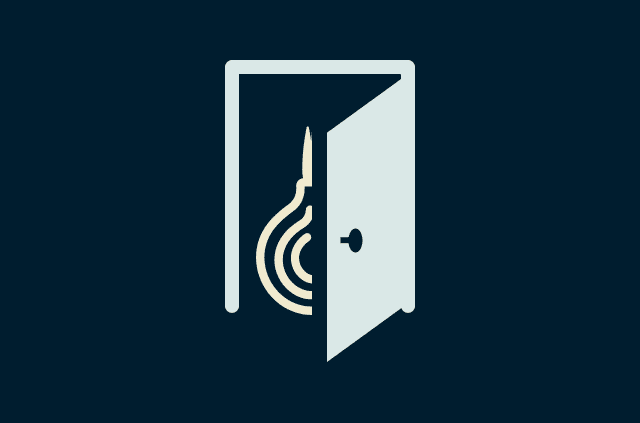
The deep web is the part of the internet that’s not indexed by search engines, such as your emails, social media feed, and cloud storage. It basically includes anything that has a virtual padlock or paywall in front of it. The dark web also forms a small part of the deep web. It exists inside layered proxy networks known as darknets. Of these darknets, Tor (short for “The Onion Router”) is by far the largest.
While you don’t need to log in to access any of the dark web links listed here, you can’t find them with a search engine like Google. The only way to access the dark web is by using the correct browser and knowing the URLs of the pages you want to visit. Scroll on to learn more about dark web links (also called Tor links or onion sites), get the right links for some of the best Tor sites, and find out how to visit them safely.
Jump to…
What are onion sites
How do onion sites work?
Best onion sites by category
-Dark web search engines
-News, media, and other information organizations
-Bitcoin wallets
-Email services
-Other privacy tools and services
-Libraries
Tor and the Onion Browser
How to access onion sites
What is the dark web?
What are onion sites?
Onion sites (aka Tor sites) are websites only accessible on the dark web; you can’t view them using a regular browser. Their URLs (aka dark web links) have .onion as the domain, instead of the common surface web domains like .com or .net.
Onion sites are considered part of the deep web because search engines like Google and Bing can’t index them. You also need to use the Tor browser to access them. Unlike most browsers, Tor is built with anonymity in mind. Before your data reaches a site, Tor encrypts your connection and redirects it through a series of servers called “nodes” or “relays” to replace your IP address with each server’s address until it reaches the website. This is intended to make your connection more anonymous.
How do onion sites work?
When you try to connect to a .onion website, Tor will route your traffic through three or more randomly chosen nodes before it reaches your destination website. Each server adds a layer of encryption, and this layered system is what lends The Onion Router its name. This is also why the sites on the dark web are called Tor links.
Your data travels through at least three hops each way, every time:
- The entry node, which inevitably knows your IP address (or your VPN server’s IP address)
- The middle (or relay) node, which prevents the exit node from finding out which entry node you used and makes it very hard to correlate any information between the two
- The exit node, which knows what site you’re connecting to, but doesn’t know your real IP address
The three nodes separate your IP address from your destination and enable two individuals to communicate without either party, or any middleman, knowing who the other is. Needless to say, it takes your data much longer to travel this way, which means dark web links load slowly compared to indexed sites.
Your real information could be exposed at these nodes, allowing third parties to intercept your dark web activity. That’s why we recommend connecting to VPN before accessing Tor—VPN encryption protects your data, and changing your IP adds an extra layer of privacy to protect you.
Best onion sites by category
Though the dark web is infamous for hosting all manner of illicit content—dark web marketplaces for buying personal information (find out how much your data is worth on the dark web), illegal drugs, gore sites, and worse—there are plenty of legitimate sites and services available if you know where to look.
Here are some of the best .onion sites on the dark web, grouped by category:
Dark web search engines
Ahmia
http://juhanurmihxlp77nkq76byazcldy2hlmovfu2epvl5ankdibsot4csyd.onion/
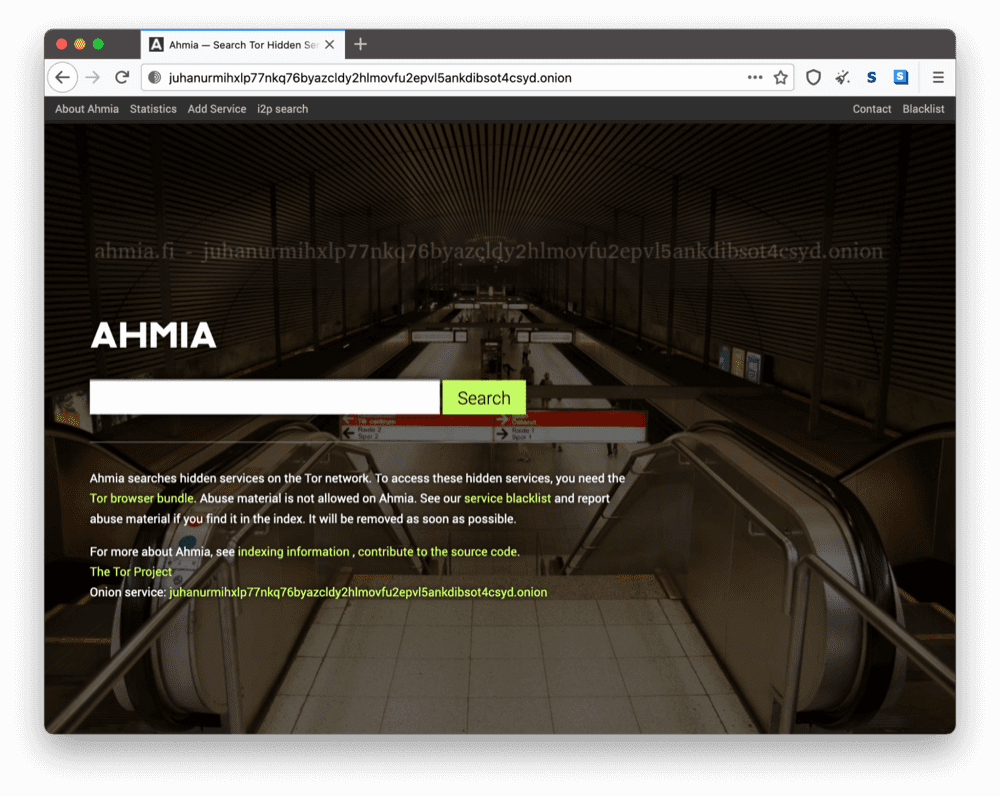
Search engines on the dark web are a bit of a contradiction because dark web sites by definition are not indexed by traditional search engines.
Ahmia, however, is not a traditional search engine. Founded by security researcher Juha Nurmi, Ahmia is essentially a list of “hidden” sites that do want to be found. Onion sites are “crawled” and added to the list provided their “robots.txt” file permits it, and if it is not on their blacklist of sites with abuse material. Site operators can also submit their own .onion sites for indexing.
Haystak
http://haystak5njsmn2hqkewecpaxetahtwhsbsa64jom2k22z5afxhnpxfid.onion/
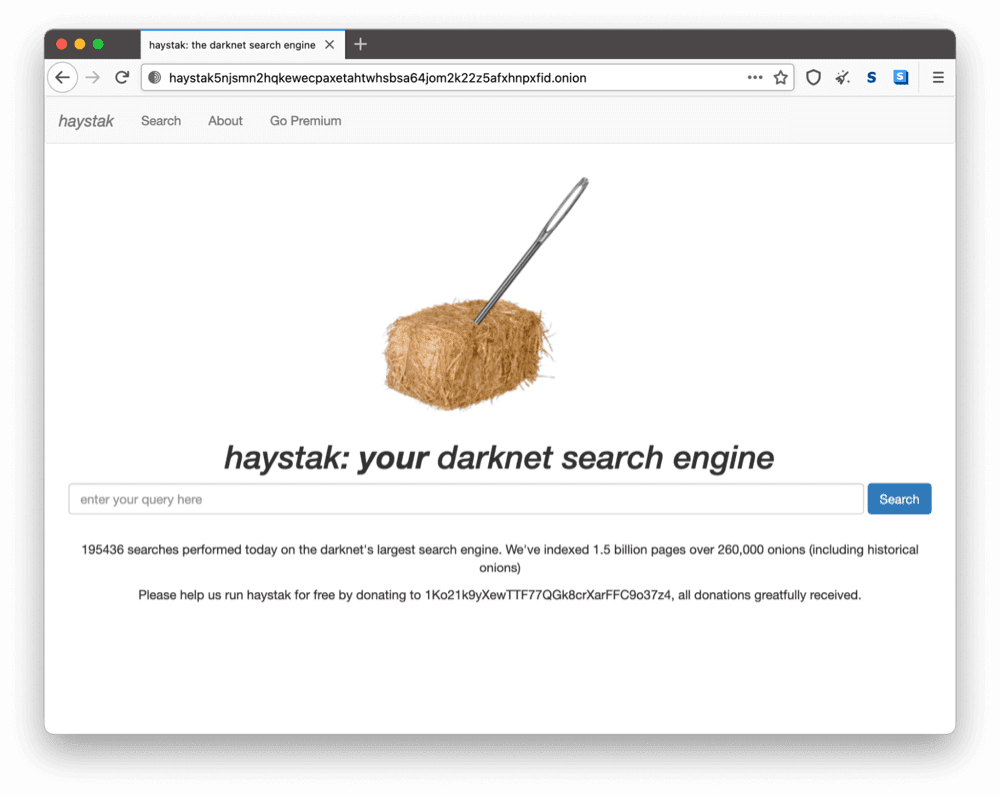
Similar to Ahmia, Haystak is also an onion search engine that uses a custom dark web crawler and filters out dangerous content.
Haystak also offers a premium version that allows advanced search, access to historical content, and email alerts.
Torch
http://xmh57jrknzkhv6y3ls3ubitzfqnkrwxhopf5aygthi7d6rplyvk3noyd.onion/
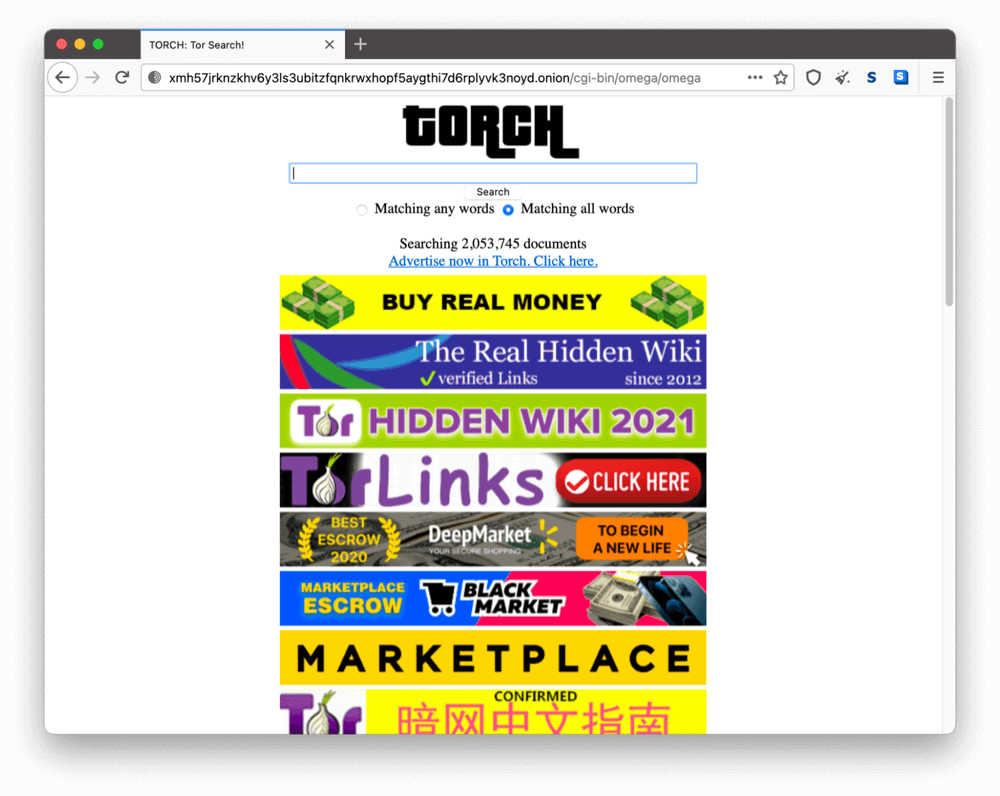
Torch is one of the oldest and most popular onion search engines on the dark web, serving over 80,000 requests per day. Torch is funded primarily through advertising—purchased in BTC, of course—which is why you’ll find the front page blanketed with old-school banner ads of dubious origins.
DuckDuckGo
https://duckduckgogg42xjoc72x3sjasowoarfbgcmvfimaftt6twagswzczad.onion/
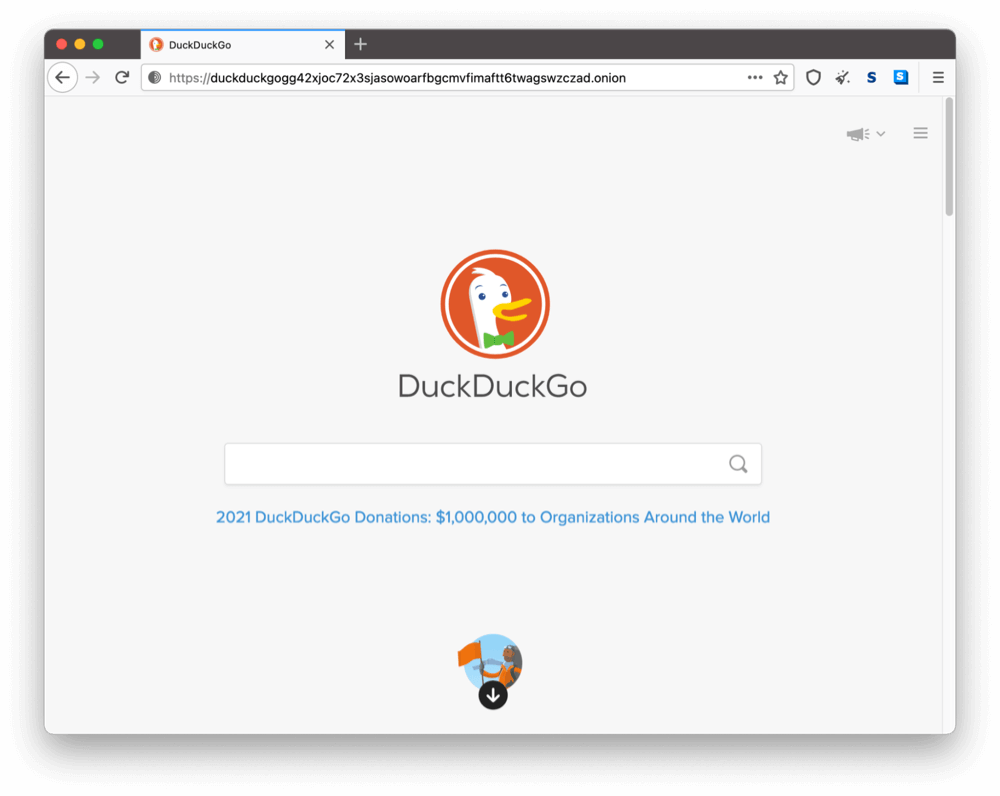
The internet’s favorite alternative to Google made a name for itself by not logging your search activity yet still providing decent results. This focus on privacy makes it the Tor Browser’s default search engine and one of the best onion search engines.
Unlike Ahmia and Haystak, however, DuckDuckGo doesn’t search .onion sites. Use it to search the normal internet from the privacy of your Tor Browser.
The Hidden Wiki
http://zqktlwiuavvvqqt4ybvgvi7tyo4hjl5xgfuvpdf6otjiycgwqbym2qad.onion/
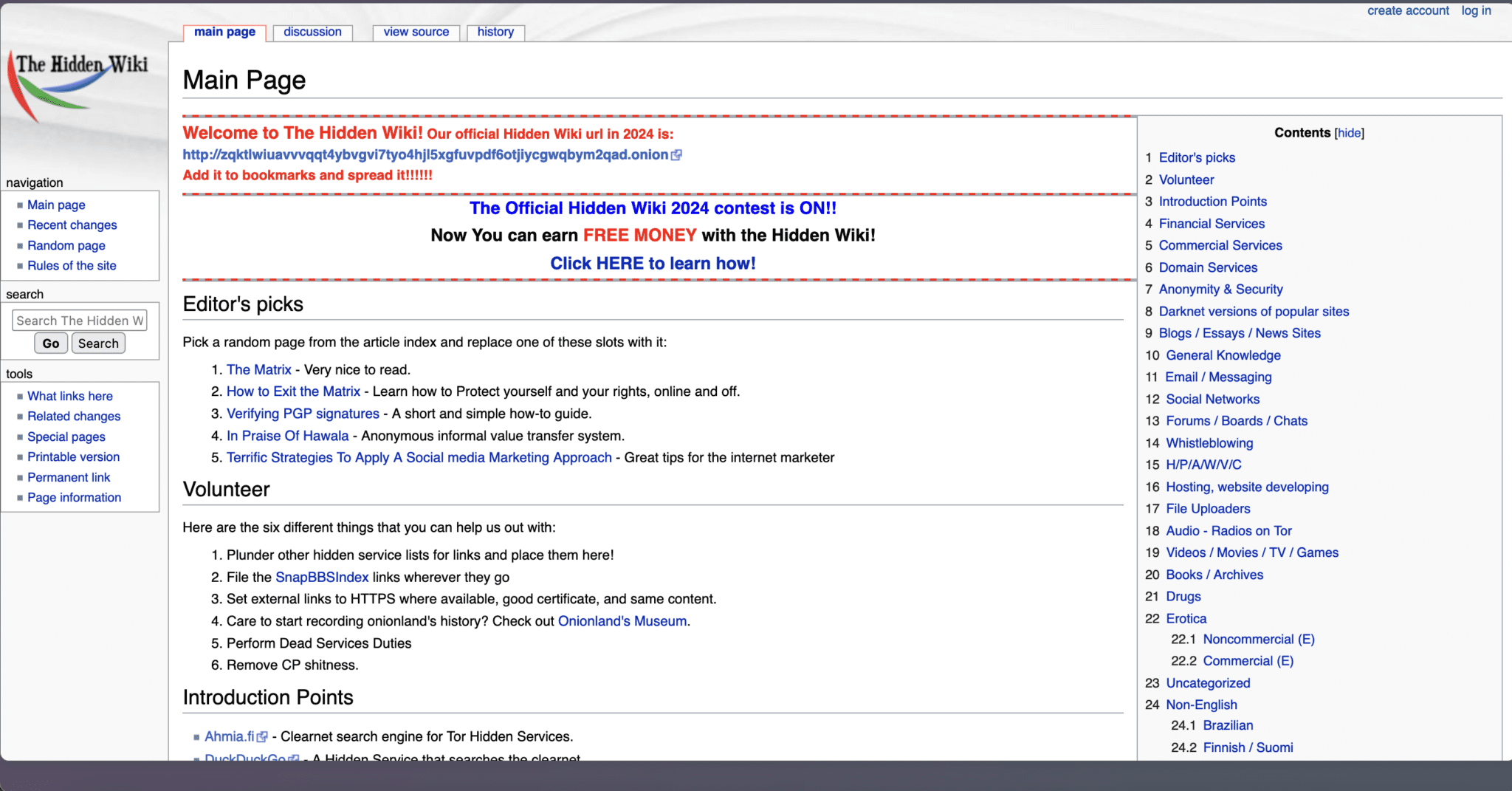
One of the most popular ways to get around the dark web is not to use a search engine at all. Just like in the old days of the internet, the dark web maintains numerous indexes of sites, like The Hidden Wiki.
This community-edited .onion Wikipedia contains a bunch of Tor links to a wide variety of services and sources running on the dark web. Many of those dark web links are defunct, and even more of them link to scams or potentially illegal activities. Click at your own risk!
Tor Links
http://torlinksge6enmcyyuxjpjkoouw4oorgdgeo7ftnq3zodj7g2zxi3kyd.onion/
TorLinks serves as a backup or secondary directory site to the popular Hidden Wiki. It's divided into commercial links (from crypto services to gambling sites) and non-commercial links (like social media). But it's not as detailed as the Hidden Wiki. As always, use Tor Links with care, as it includes onion links to dubious or illegal activity.
Read more: Best dark web search engines
News, media, and other information organizations
ProPublica
http://p53lf57qovyuvwsc6xnrppyply3vtqm7l6pcobkmyqsiofyeznfu5uqd.onion/

The first online publication that won a Pulitzer became the first major publication with a .onion address.
ProPublica does a lot of things differently. Its source of funding is the deep wallet of the Sandler Foundation and various other similar organizations.
Browsing ProPublica’s work through its .onion site works well, and the site’s very existence is a big win for privacy and free speech.
Archive Today
http://archiveiya74codqgiixo33q62qlrqtkgmcitqx5u2oeqnmn5bpcbiyd.onion/
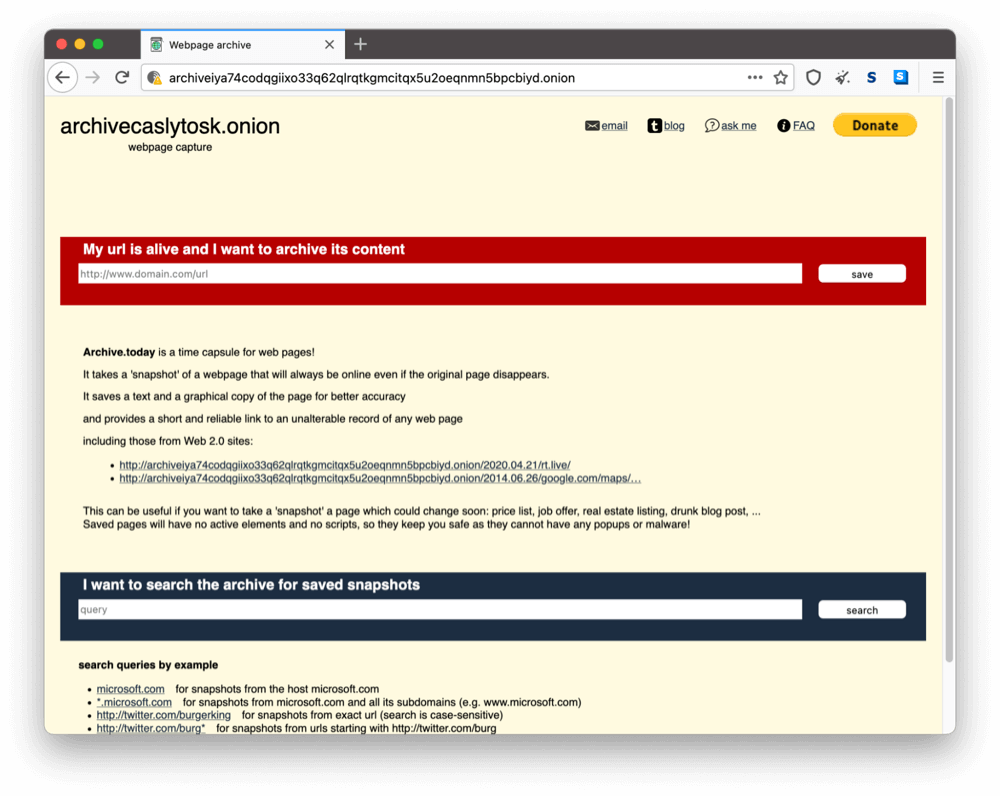
Archive.today (formerly known as Archive.is) is a platform that aims to preserve the web’s cultural and scientific heritage.
Founded in 2012, it stores snapshots of websites, making it possible to “go back in time” and see what websites used to look like and what information they contained.
Archive.today is considered an important tool to track changes across government and corporate websites, preserve cultural heritage, and keep knowledge outside of autocrats’ reach. You can archive any site you want, or retrieve historical records wherever available.
The New York Times
https://www.nytimesn7cgmftshazwhfgzm37qxb44r64ytbb2dj3x62d2lljsciiyd.onion/

To make its journalism more accessible to readers around the world, the New York Times launched its onion service in 2017. You won’t find any “hidden” stories here—it’s the same content as the normal web edition—but users in countries with government censorship will appreciate having a secure way to access it.
BBC
https://www.bbcnewsd73hkzno2ini43t4gblxvycyac5aw4gnv7t2rccijh7745uqd.onion/

Following the NYT, the BBC launched a dark web “mirror” of their international edition in 2019. Note that some features of the normal website are not available on the .onion version, including BBC iPlayer.
https://www.facebookwkhpilnemxj7asaniu7vnjjbiltxjqhye3mhbshg7kx5tfyd.onion/
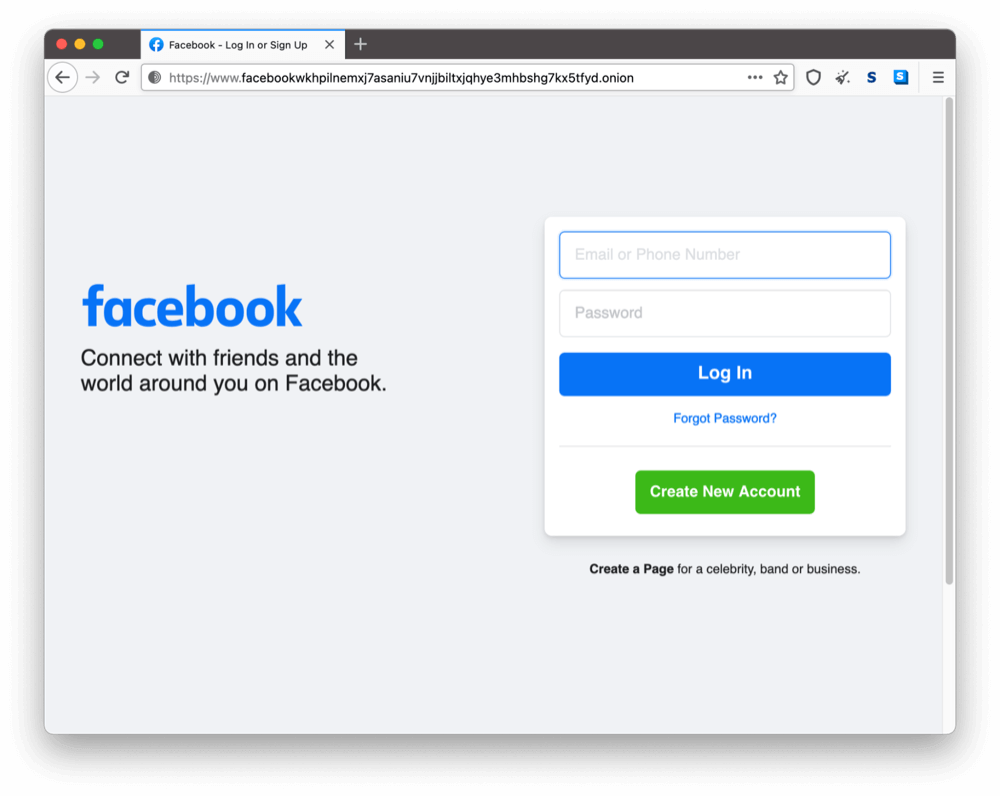
Why would one of the largest organizations known for its invasiveness and controversial clear-name policy have a .onion address?
Facebook is aware of attempts by many governments to restrict access to a tool that allows strangers across the web to talk and collaborate freely. While its .onion address doesn’t make it much easier to maintain an anonymous account, it does make Facebook more accessible in places where it’s censored.
CIA
http://ciadotgov4sjwlzihbbgxnqg3xiyrg7so2r2o3lt5wz5ypk4sxyjstad.onion

The CIA might seem an odd inclusion in a list for privacy enthusiasts, but Tor actually has an unlikely history with the U.S. government: it was first developed by the U.S. Navy to help informants posted in foreign countries to relay information back safely. In that spirit, the CIA launched an onion site to help people around the world access its resources securely.
Bitcoin wallets
Wasabi Wallet
http://wasabiukrxmkdgve5kynjztuovbg43uxcbcxn6y2okcrsg7gb6jdmbad.onion
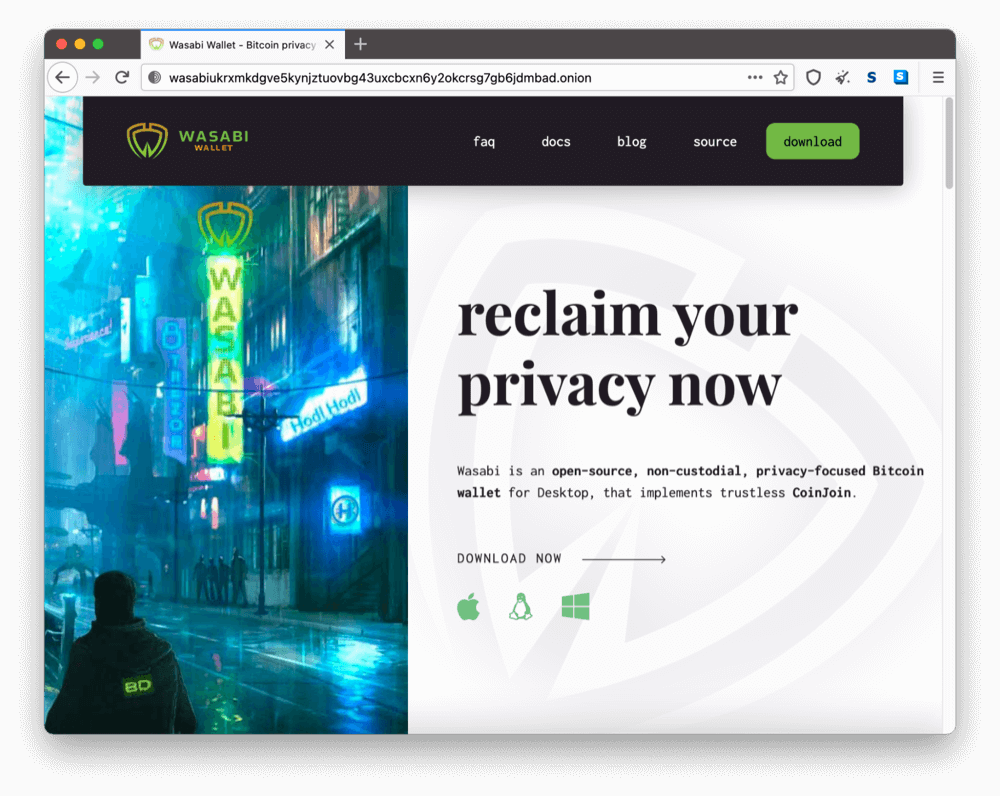
Wasabi Wallet is a Bitcoin wallet that not only hides all your data in the Tor network but also allows you to "join" your transactions with others to increase your anonymity. This makes it incredibly difficult to find out who you are paying.
The process costs a fee, but unlike other "tumbler" or "mixing" services, there is no risk that Wasabi or any of its users could scam you out of your coins.
Email services
ProtonMail
https://protonmailrmez3lotccipshtkleegetolb73fuirgj7r4o4vfu7ozyd.onion/
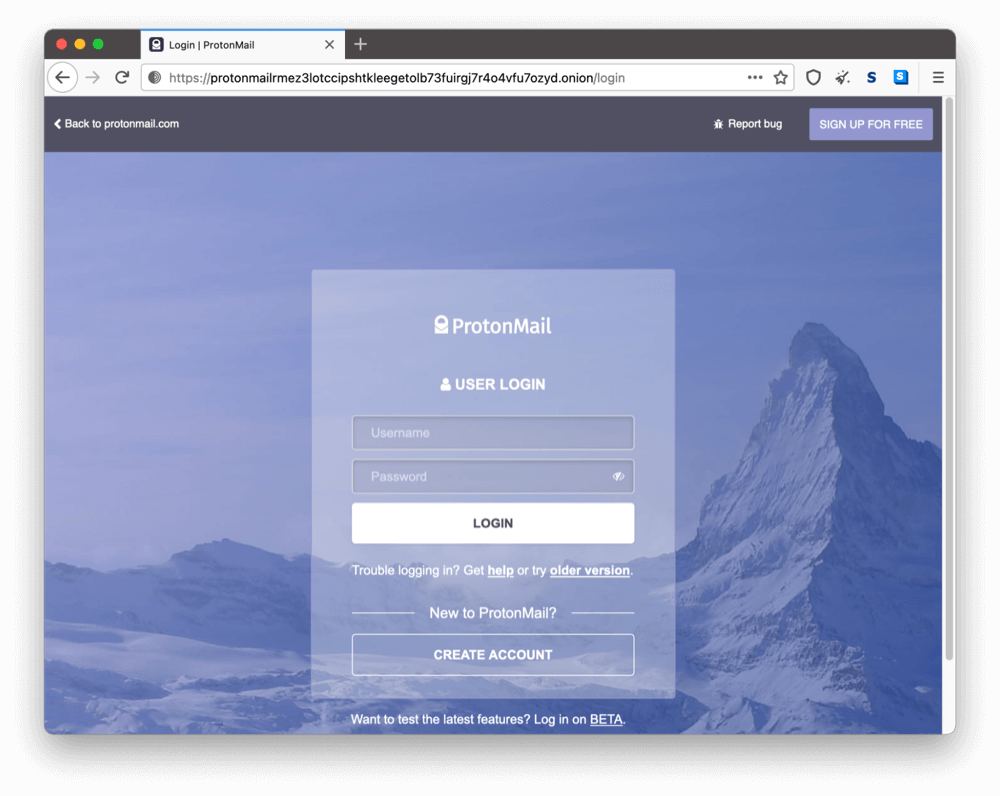
Based in Switzerland, ProtonMail is an encrypted email service that is very popular with cryptocurrency enthusiasts. It’s not free, but it’s extremely secure.
Riseup
http://vww6ybal4bd7szmgncyruucpgfkqahzddi37ktceo3ah7ngmcopnpyyd.onion
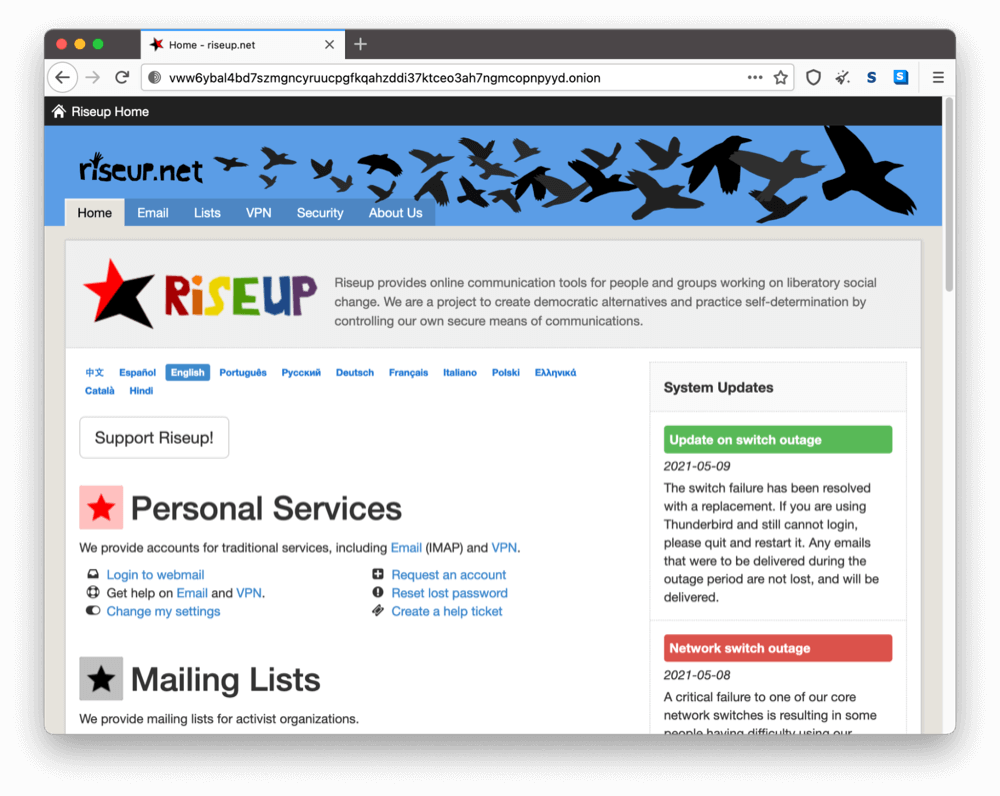
Riseup is a volunteer-run email provider for activists around the world.
Founded around 1999 by activists in Seattle, it has since grown to over six million users worldwide. It publishes a newsletter in multiple languages and not only runs onion services for its website but all its email and chat services.
Other privacy tools and services
Keybase
http://keybase5wmilwokqirssclfnsqrjdsi7jdir5wy7y7iu3tanwmtp6oid.onion/
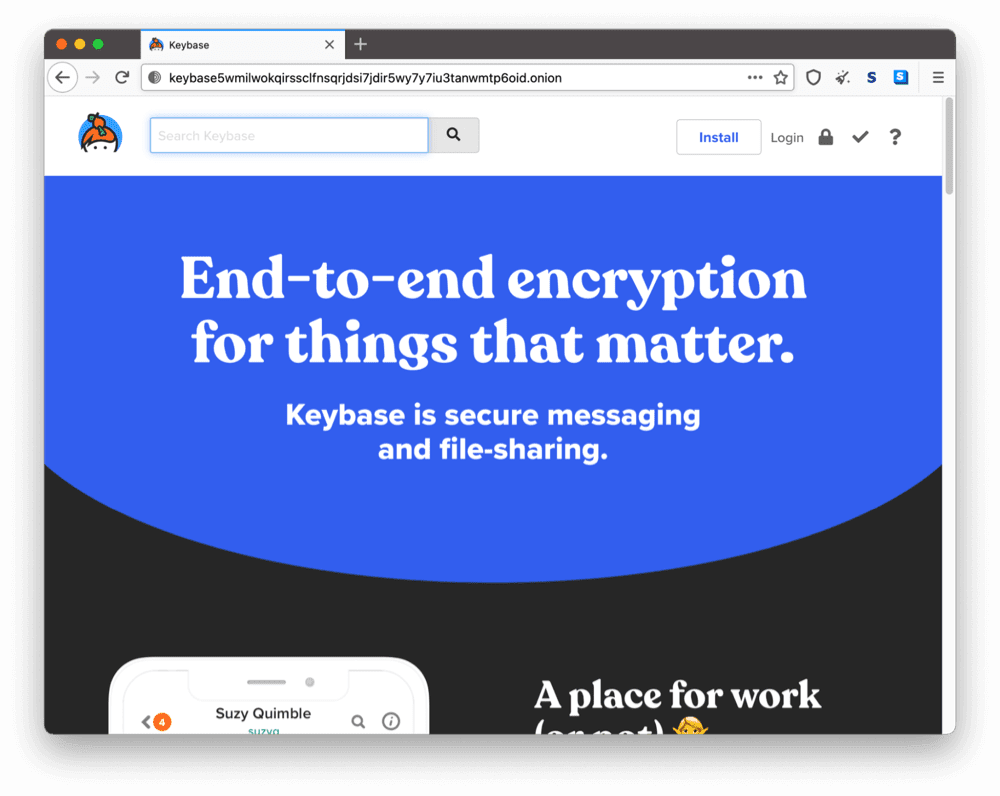
Keybase is an exciting identity service that aims to make it easy for you to link the presence of your online identities together in a cryptographic way. You can upload your PGP key or have the site create one for you, and use it to cryptographically link your Twitter profile, Github account, or Bitcoin address together.
Keybase also offers extremely user-friendly secure chat and file-sharing services through its app.
ZeroBin
http://zerobinftagjpeeebbvyzjcqyjpmjvynj5qlexwyxe7l3vqejxnqv5qd.onion/
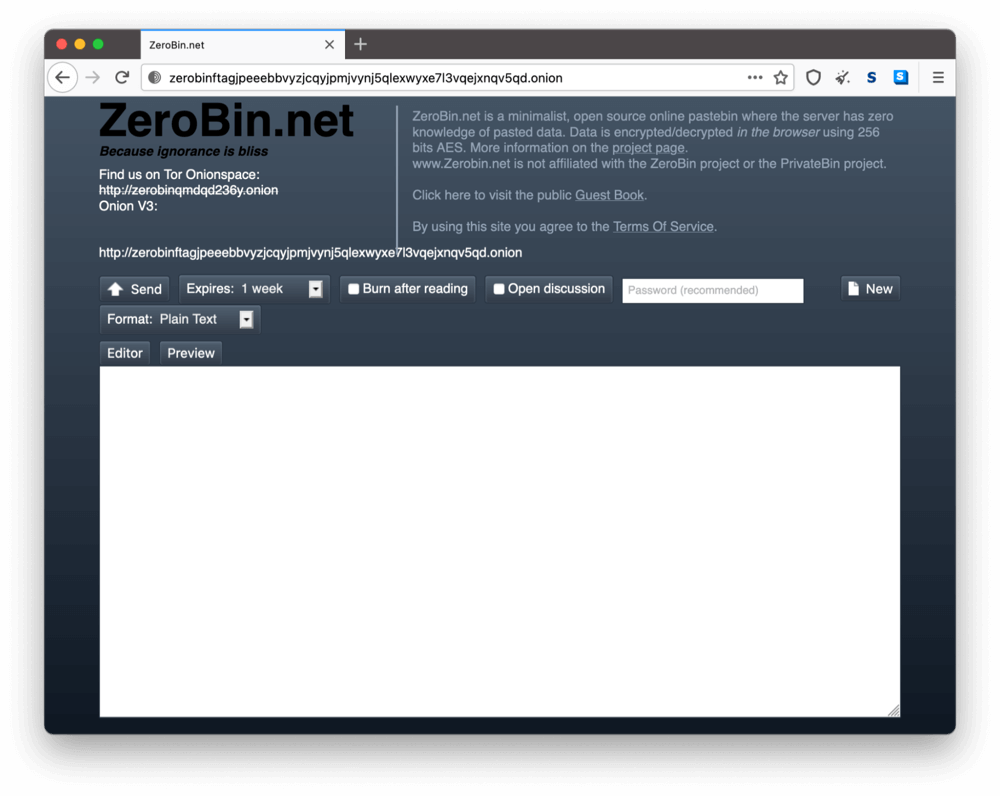
Pastebins are text sharing services, useful for sending and sharing large snippets of code or text. ZeroBin offers an extra secure version of this service by only encrypting and decrypting text in the browser, meaning their servers have no knowledge of what is passing through it.
SecureDrop
http://sdolvtfhatvsysc6l34d65ymdwxcujausv7k5jk4cy5ttzhjoi6fzvyd.onion/
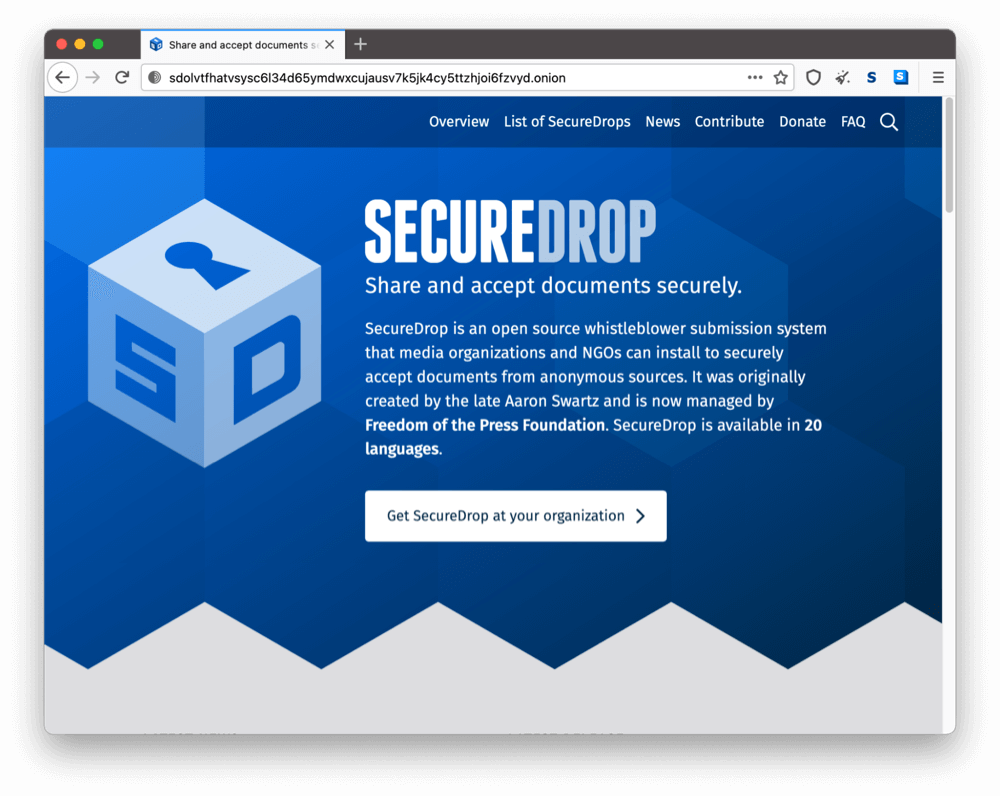
A favorite of journalists and their anonymous sources, SecureDrop makes it easy to share confidential information without revealing your identity. Many news publications, like the ones listed above, have a SecureDrop on their .onion sites.
Impreza Hosting
https://imprezareshna326gqgmbdzwmnad2wnjmeowh45bs2buxarh5qummjad.onion/
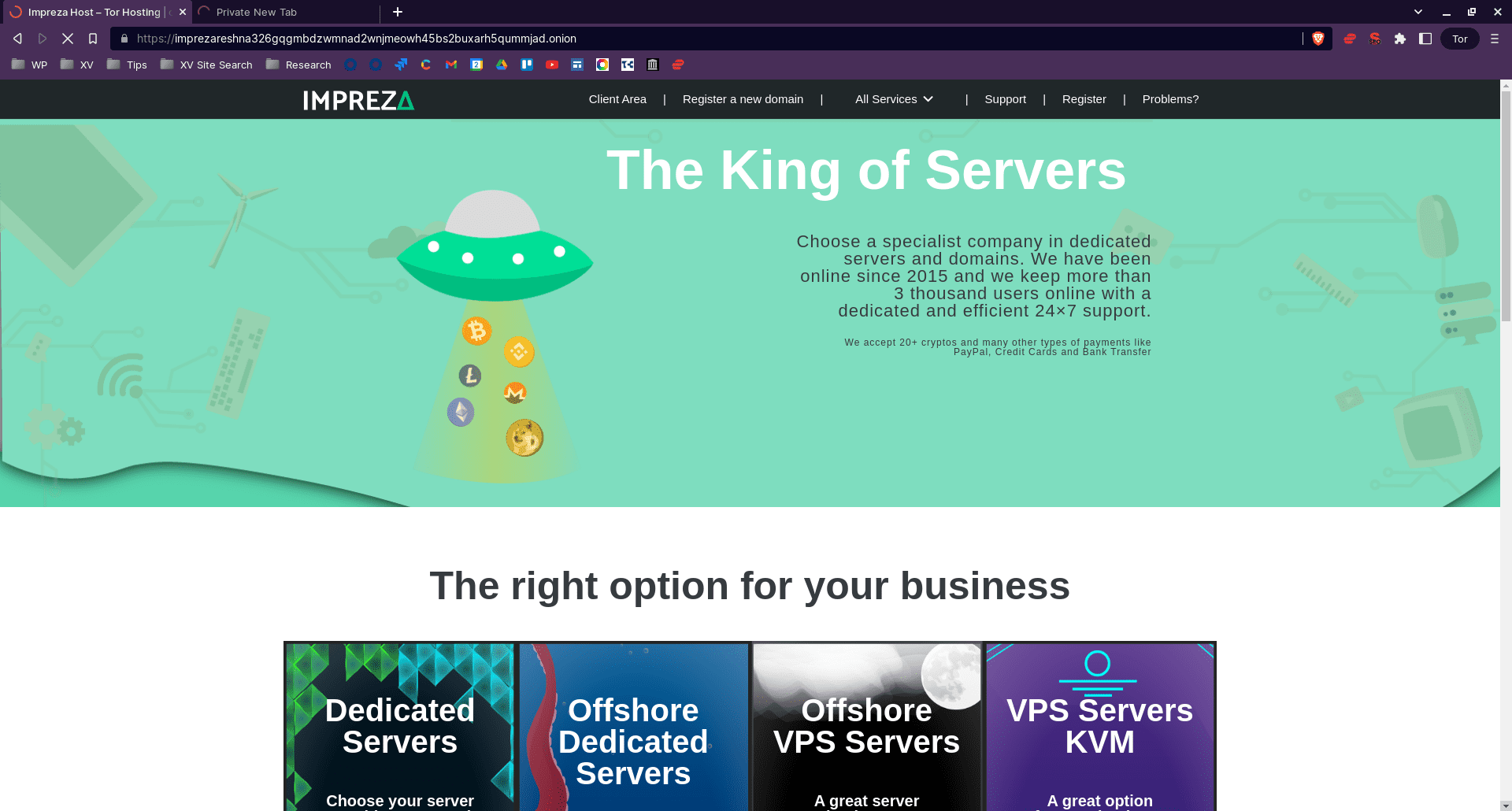
Impreza Hosting is a service that helps you host a site on the Tor network. It provides an .onion URL and an interface for you to manage your Tor site easily. It also boasts that no personal information is required to use the service, and payment can be made with cryptocurrency.
Libraries
Just Another Library
http://libraryfyuybp7oyidyya3ah5xvwgyx6weauoini7zyz555litmmumad.onion/

Offering books for free, shadow libraries face the morality question of copyright vs. access to information and knowledge. Just Another Library is one such service, with a wealth of books covering computer programming, science, and niche hobbies (sailors' knots, anyone?). It also offers works of art, course material, and audiobooks for download.
But, as is the case with visiting any free book site, you'll have to decide how OK you are with reading a book without paying for it.
Comic Book Library
http://nv3x2jozywh63fkohn5mwp2d73vasusjixn3im3ueof52fmbjsigw6ad.onion/

Comic Book Library is not just about evading copyright and offering books for free. Because so many of the comic books are vintage and not easily available, it's more about letting you explore the cultural artifact that is the comic book, going back to the 1930s—the Golden Age of comic books.
Bonus: Sci-Hub
While technically not an onion site, we’re including Sci-Hub (sci-hub.se) as an interesting example of a site you can access via Tor. Sci-Hub gives access to millions of scientific papers, mostly ones from behind paywalls. However, due to copyright infringement, Sci-Hub is considered illegal and banned in many countries. Just like any other site, visit it at your own risk.
Tor and the Onion Browser
Inside the Tor network, sites cannot use regular domain names. Instead, they use pseudo-domain names ending in .onion. These domain names are not registered with a central authority but are instead derived from cryptographic keys.
You can’t access these .onion sites from your normal web browser like the one you’re probably viewing this page on. Before clicking any of the dark web links below, you’ll need to get the Tor Browser (also called the Onion Browser) or another service that provides dark web access, such as the Brave browser.
Note that connections inside of the Tor network are end-to-end encrypted by default, meaning there is no separate encryption layer necessary as with regular websites. That’s why most onion sites do not have the S in HTTPS. Fear not: the Tor Browser will show an onion instead of the familiar lock icon when your connection is secure.
How to access onion sites
We strongly recommend connecting to a VPN before you open any dark web links. This will protect your privacy and add another layer of security, keeping your browsing private from your ISP, cyber attackers, and other third parties. Once you’ve subscribed to ExpressVPN and installed the app, it takes just a few seconds to turn on the VPN before using Tor.
On your computer
- Download Tor Browser from here.
- Install Tor Browser on your computer by opening the file you downloaded and following the prompts.
- Open Tor Browser.
- Click Connect on the Tor startup page.
- Wait for a connection to be established.
- Surf the dark web!
You can also use Brave to access the dark web on your computer. Find the instructions here.
On Android
- Download the Tor Browser app from the Google Play Store.
- Open Tor Browser.
- Tap Connect
- Once a connection is established, you should see an onion icon in your status bar.
- Start exploring!
On iOS
- Download Onion Browser from the App Store
- Open Onion Browser.
- Tap Connect to Tor
- Once connected, tap Next to configure your security level:
- Insecure
- Moderate
- Secure
- Tap Start Browsing
- You’re in!
Note: The Onion Project doesn’t have an official Tor browser for iOS, but has officially endorsed the open-source Onion Browser. If you want to use Tor on your iPhone, this third-party app is probably your safest option.
What is the dark web?
The dark web contains content that’s only accessible through networks like Tor. Sites in the dark web have .onion as their domain in their URLs. Tor browsers create encrypted entry points and pathways for the user, so dark web activity remains anonymous. The encryption technology routes users’ data through a large number of intermediate servers, which protects the users’ identity and guarantees anonymity.
Because of its anonymity, the dark web is filled with illegal services and is used by numerous criminal groups, including ransomware gangs. It is also used by whistle-blowers, journalists, and other individuals who are not involved in illegal activity but need to protect their communications and identities. Through the dark web, users in places of high censorship can also access information and news.
Difference between dark web and deep web
The dark web and the deep web are often used interchangeably, but they’re two distinct concepts. In short, the major difference between them is that the deep web contains internet content that you can’t find through search engines, while the dark web is a hidden network that requires a special browser to access.
The deep web is the part of the internet you can’t access through search engines like Google and Bing. Also referred to as “non-indexed” content, it’s any content hidden behind some kind of access control such as a log-in or code word. Ever wonder how big the deep web is? It contains 7,500 terabytes of information, compared with only 19 terabytes of information in the “surface” web. To look at it in a different way, it makes up between 90% and 95% of the internet.
The dark web, or the darknet, is a small subset of the deep web. It’s a hidden collective of sites that you could only access through a special browser. Since all activity on the dark web is anonymous by default, it is definitely where the murkiest transactions on the internet take place. A study by researchers at King’s College London that examined the contents of over 2,700 darknet sites found that approximately 60% of them hosted illicit content. With that said, legitimate websites also exist on the dark web.
Read all the differences of deep web vs. dark web
Before you jump onto the dark web…
You’ve likely heard about the dangers of the dark web before. While people and organizations do host legitimate and useful sites on the dark web, it’s still best to tread cautiously. Despite Tor’s privacy-focused design, malicious entities are more likely to target your data in transit and on .onion sites. Using Tor to access dark web links isn’t illegal, but your ISP will notice, and others may too. It’s, ironically, more conspicuous than using popular browsers and sites.
Your ISP, and possibly the authorities, may decide to start monitoring your activity more closely to look for threats or illegal activity. That’s why we always recommend using a VPN over Tor—even if you feel you have nothing to hide. This just involves turning on your VPN before you open Tor and connect to dark web sites.
A VPN protects your connection against everyone, not just your ISP and the authorities. It encrypts your connection to prevent outsiders from being able to read your data and masks your IP address with one from a VPN server—so whoever’s looking can’t get any useful information. This process also prevents your ISP from seeing your data or where it’s going. Since the ISP can’t detect you’re accessing dark web URLs, it won’t trigger any alarms about your online activity.
ExpressVPN uses the best encryption on the market to protect your data. The app also comes with a built-in tracker blocker that prevents malicious scripts from loading. This adds another layer of protection when you’re visiting the dark web on top of the privacy and security our encryption and IP masking provide. Our strong no-logs policy and RAM-only servers protect your privacy, even from us. It takes just a few minutes to subscribe to ExpressVPN, download the app for your device, and connect.
Dangers of the dark web
While the dark web boosts freedom of information and communication, it’s also filled with dangers. These are the primary concerns:
- Scams. The dark web has lots of people offering attractive deals, whether it’s some kind of investment opportunity or the sale of hard-to-find items. Bear in mind that nearly all offers and deals on the dark web are scams. The anonymity that the dark web offers make it an suitable environment for scammers to operate. Stay away from any kind of transaction.
- Malware. There are two facets to malware on the dark web. One is simply the prevalence of malware being sold on the dark web. The other is the use of malicious links to lure people into downloading malware unintentionally. A malware download could result in infiltration of your device, leading to data theft.
- Objectionable/illegal content. The dark web has a reputation as a place for criminals to house and trade illegal content. Stumbling on this kind of content could be unpleasant or even get you into legal trouble.
- Increased surveillance. The dark web is known to harbor illegal activity, which means it also attracts increased attention from authorities worldwide. Just using dark web links via the Tor browser can put you under their radar in a number of ways. This could lead to unwanted attention from the authorities who may try to invade your privacy.
- Misinformation echo chambers. Websites on the dark web aren’t regulated like those on the surface web. The level of anonymity it provides to website hosts and visitors can attract people who may voice opinions, conspiracy theories, and fake information that would otherwise be removed, debunked, or even lead to fines or jail time.
How to stay safe on the dark web
With the above dangers, it’s imperative to tread carefully as you step into the dark web. Follow these tips.
- Avoid downloading files from the dark web. The dark web’s dodgy reputation isn’t for nothing. Files on the dark web are likely malware-laden.
- Don’t click on unfamiliar or suspicious links. While it’s hard to avoid clicking on links when exploring dark web directories and search engines, there are plenty of scam pages on the dark web; it’s best to exercise caution.
- Don’t submit personal information. Never submit personal information of any kind on the dark web. If you need to use an email address, create a new one, preferably from a privacy-focused email service like ProtonMail.
- Don’t buy anything on the dark web. We say this not only because there is no guarantee any seller on the dark web is legit but also because most things you can only buy on the dark web are illegal.
- Use a VPN. Download a VPN and connect to it first, then Tor. This gets you all the privacy protection of the Tor network, plus added protection that prevents any Tor node from seeing your home IP address and your ISP from seeing you’re using the dark web. ExpressVPN provides a 30-day money-back guarantee, with full access to our app’s built-in privacy and security features.
FAQ: More about onion sites
What are onion sites used for?
Naturally, this makes the dark web a breeding ground for illegal activity. But onion sites can also serve nobler goals, like providing access to information and independent journalism in countries with government censorship.
Activists, whistle blowers, and journalists also use the dark web to communicate securely with sources and news organizations.
Is it illegal to visit onion sites?
What kind of content is on the dark web?
Some content, however, is only available on onion sites so as to evade detection by law enforcement: namely gore sites and other illegal media, and marketplaces selling illegal items such as drugs, weapons, and fake documents.
Needless to say, we don’t condone any content forbidden by law.
What can you buy on the dark web?
But that doesn’t mean you should! As stated above, we don’t condone any activity—on the dark net or otherwise—that is forbidden by law.
Can you access the dark web with a VPN?
This method is called Tor over VPN, and it’s a great way to increase your privacy over using Tor alone.
Are onion sites safe?
As when visiting ordinary websites, stay alert to security risks on onion sites. Don’t click on suspicious links, be skeptical of what you read, and avoid dark web marketplaces if you don’t want to stumble on illegal activity or content.
Why can’t I access onion sites?
If you are using Tor Browser but still can’t access an onion site, it’s possible that the link has changed (the Tor Project upgraded onion links to become much longer during 2017-’18), or the site simply no longer exists or is temporarily down. You could try to visit a major site like Facebook’s onion site to check if your browser is working at all. This would verify if it’s a browser issue or just an issue with the site.
How many onion sites are there?
Can you be traced on Tor?
How do I access onion sites on my mobile device?
On iOS: -Download Onion Browser from the App Store -Open Onion Browser -Click “Connect to Tor” -Once connected, click “Next” to configure your security level: Insecure, Moderate, or Secure -Click “Start Browsing” -You’re in!
Why is Tor so slow?
Does Tor hide your IP address?
Who is Tor owned by?
Do I need a VPN if I use Tor?
If you only want to mask your IP address and don't need to access the dark web, then going online with a VPN is much easier and faster than using Tor.
Does the CIA have an onion site?
How are onion sites hosted?
Take the first step to protect yourself online. Try ExpressVPN risk-free.
Get ExpressVPN
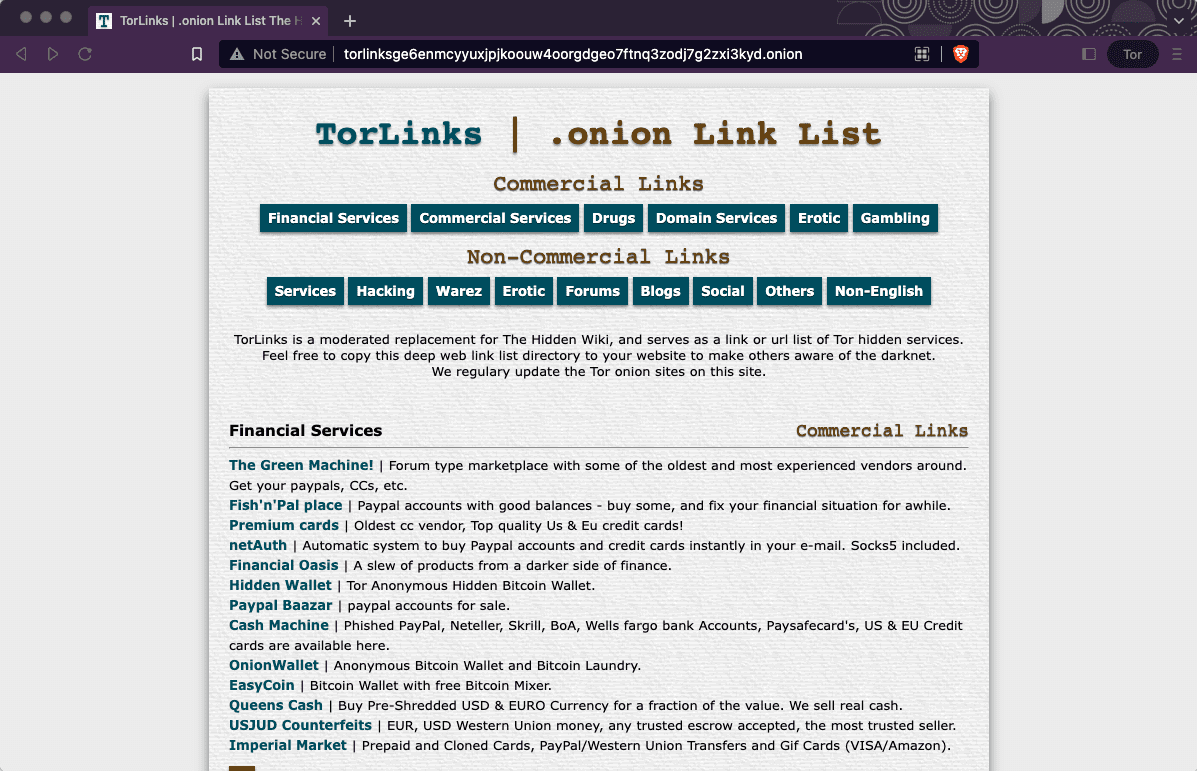
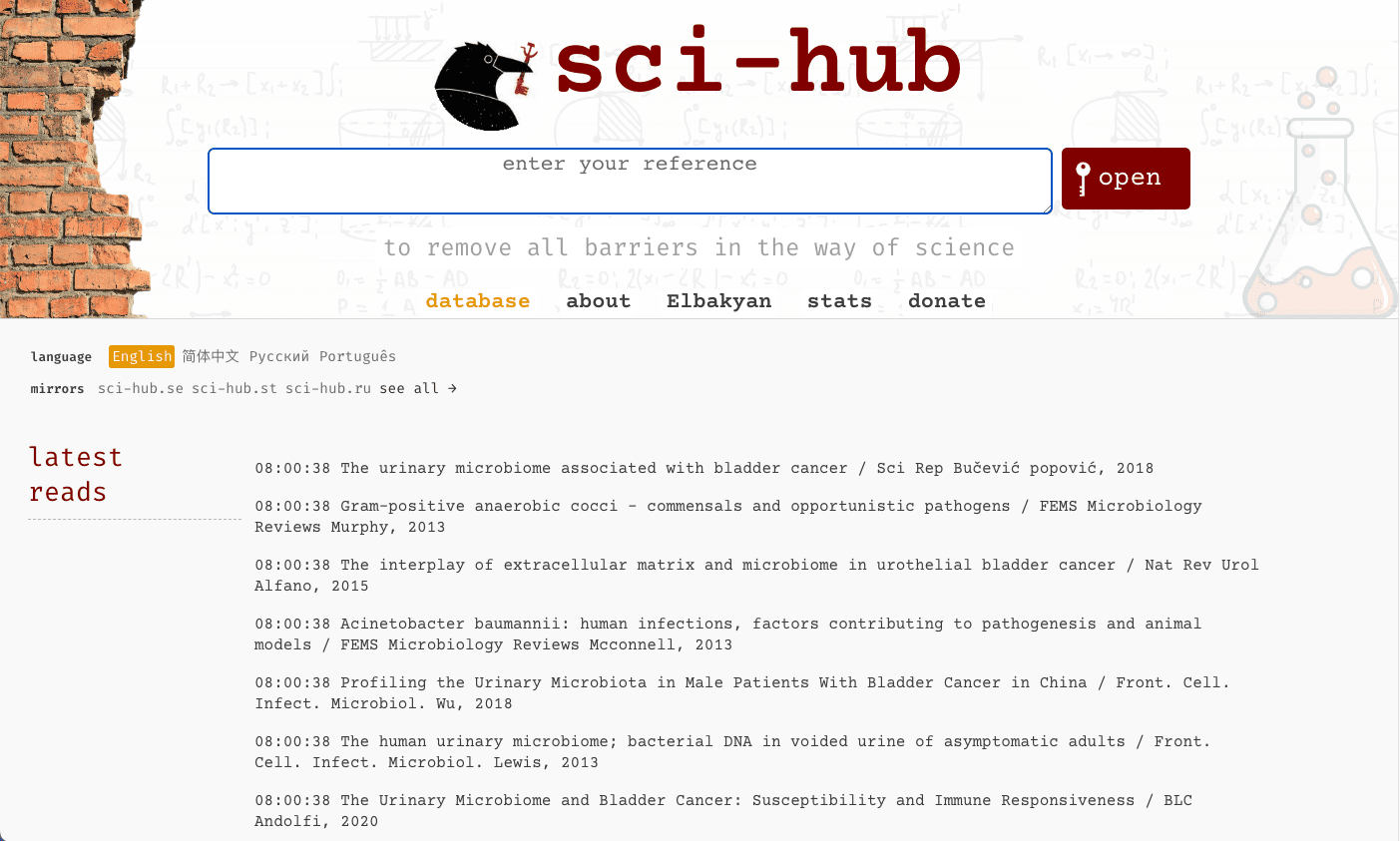





Comments
This article is click bait - sub par.
Sorry you didn't like it. We think it's a cool list!
Just curious.. How long have these tor sites and tor browsers been around? I think it's pretty cool! & your artical is very informative! On another note, not all these sites are bad for example the sci-hub! I love that we can read scientific research. But what are some risks of having a tor browser? & should i have a vpn while using a tor browser? Or is it unnecessary? Its freaking 2017 and im just finding out about this..
Hi! Tor was developed in the mid 1990s by the U.S. Navy, but the project was taken over by the EFF in 2002. We have a cool article about the history of Tor, check it out! Theoretically your Internet Service Provider (ISP) can detect whether or not you are using Tor, but in most places that is not a problem. If you are worried about it, use a VPN and open the Tor Browser once you are connected. Neither your ISP nor your VPN can see what you are doing in the Tor Browser, and your ISP cannot find out that you are using Tor. Lexie
Great article! I was wondering if there are any cool book finder onion sites? I was looking for some math textbooks online (can't afford them hehe) and couldn't find them. (for educational purposes of course).
I cannot help you with that! But they say one can find anything on the dark web, even books! Lexie
How do i join dark wab
im stealing your grapes "jerry". you dont dont wanna join the daarrk web.
This was a helpful and well written article. Thanks for introducing me to the Matrix!
This list is a bullshit! its just some iditos wannabe to get money from whom people viewing and use the links posted in the blog post! DANG
No, we don't make money from any of the external links. We just sell VPN subscriptions and love online privacy. We are also supporters of Tor and operate a .onion site ourselves. Lexie
I'm honestly surprised you respond to such ignorant people. This comment section hurts my neck, i dont think my heads stopped shaking since i started reading the comments. I appreciate you spreading awareness about the dark net but these people are not its target demographic. The dark net is for intelligent people who want anonymity. Stupidity like the comment you just replied to makes me ok with the fact they're not using tor. Im not trying to sound arrogant or be arrogant or elitist for that matter but its just sad. It was a good article but most people wont get the point.
hear ya on that
Stupid article
So am I able to check out the dark web without running the risk of getting in trouble legally? I'm not looking for anything legal whatsoever but am very curious.
Yes, checking these sites out carries no legal risk. While of course it also depends on what country you are in, it is extremely unlikely that you will get caught just surfing these sites out of curiosity. Use the Tor Browser, it is a powerful anonymity tool!
I do not think I'm in a country were it is illegal and was wondering can I get on dark websites with out a vpn or anything
Yes, you do not have to use a VPN to get on the dark net. All you need is the Onion Browser which you can download from its official site here. Lexie
I tried to acces DuckDuckGo and I got the "No se puede acceder a este sitio. No se encontró la dirección DNS del servidor de 3g2upl4pq6kufc4m.onion." errror. Same thing with Facebook. Is this article just old or it is......?
You need the Tor Browser to access onion sites. You can download the Tor Browser here: https://www.torproject.org/
Nice content will sure head up to look more deep dark below, I use tor for android for VPN since accessing VPN sites are even prohibited in UAE
Great site! I wish to seek more improvements soon.
Thanks for finally writing about >9 must-see .onion sites from the depths of the dark web <Loved it!
You're welcome!
I know there are a lot of good stuff, but I don't feel safe browsing the darknet
The whole point of the dark net is the fact its way safer than your standard internet. Your more at risk now than if you were using tor. Just don't get scammed by someone, same as people try to do regularly on normal .com's. Do some research and you'll see if you want to feel safe the darknet is where you want to be.
Never used. Too complex for me. rather simple vpn.
i like facebook
Yeah, I only just started checking the "Dark Web" out an like why the hell would you be worried about the legality of being here? Are u kidding me! There r alot of sites that people should worry about on the "Light Web". It's people like that who really scare me, because they usually wind up in some high powered position where there there anal approach to things make the rest go friggin crazy. Anyway im sure they can look up Angels, an my little pony crap without fear of being ridiculed by someone like me who just doesn't get those people. Oops, I was ranting my bad. Lol
Very eddicaed poster !! Studdied alot no dout !!
How can open dark web ?
Hi Meer, you need to use the Tor Browser to access dark web sites.
how to signup on dark web
really a nice articul please canyou help with with onion sites where i can meet online hackers i really want to learn how to hack thanks lexie really want to meet good ones online
ji
hi
I need this app
So you get the VPN first, then Tor ??
Just a few things to note especially for those whom are new to Tor or VPN. First thing first get a VPN before even accessing Tor site to download the browser or even git hub. EVERYBODY in this world that is using the internet should do so via a safe VPN service. There are good solid VPN providers out there USE THEM, ExpressVPN is among the very best and the one I use so take your pick. Reason for VPN - it hides you as long as it is installed correctly and starts with your computer, meaning it stops the operating system from opening any access sockets/ports when the machine is switched on. Once the VPN client is up and ready it opens and route the traffic leaving the machine. VPN encrypt your information, so lets use a postal system as an example. Imagine posting a letter in an envelop with coded information/address on the front, first the letter is written and put in the envelop the return/from address is hidden by VPN the envelop is sealed by VPN (titanium style 256 grade), so, when it gets into the shipping/postage line and away it goes, all along the way the sorting office, the postman, the post office and bob the security at the gatehouse checking the van and content has no clue what is in your letter or whom it is coming from or where it's going - NOTE all the hiding is done via VPN all these other entities see is it is coming form a fake address set via VPN and going to another VPN address. They can't open it because they haven't got the key. AT THIS POINT where it leaves the sorting office for its final destination, Tor only traffic, Tor can fail (exit node issue) but if it is in a VPN tunnel (shipping/postage channel) anyone at this stage (snooping around) will see the VPN encrypted data, oh boy will they be pissed off, all that waiting in vain. To get the world on board we need Firefox to have native support for three or four top VPN service providers. So all we have to do is pop in a user name and password and away we go forever free and anonymous. (Browsing only) Other non-browser traffic would still be visible over the internet. Another solution is a VPN Router, Lynksys routers are the best for this and could set you back up to £400 for a top end one. Finally, always use VPN, get it, install it and ensure it is installed correctly, then Tor or Firefox, avoid Chrome and Chrome base browsers. They are based on google code which I know collects information from users. Trust no company to keep any data for you or about you. If you want to go mad then use QubeOS, VPN, Tor, Firefox, use with USB boot drive and USB storage so there is absolutely nothing on the laptop that could be used to identify you. Keep USB safe and backups hidden, this is for advance users possibly login into remote stealth servers. Standard home users just need VPN and Firefox or possibly Tor if you want to use the Dark Web for legitimate reasons.
Thanks Joshua. Article very very helpful
please i need your help
how to opan dark site
Word
can we get free vpn, that is good and strong
Remember that old saying godwin? You GET what YOU pay for? Don't go free with any security! Not antivirus, not email ( Free ones for junk mail are GREAT) and CERTAINLY NOT a vpn! Like someone else mentioned above, vpn's cost money. A friend of mine got a "great deal" he paid $60 usd for a lifetime. Uhhhhhhh, great deal? No. How can a company continue to upgrade and provide electric, real estate, server upgrades, customer support etc. when, everyone PAYS once for LIFE? Hmmm Then, go the opposite route, free. How secure and how "private" is facebook? After all, it's "free" right? Long story short, You get exactly what you pay for. Personally, I use a subscription based vpn, the good ones WILL cost you maybe the same as 2 beers at a bar. BUT, again, YOU get what you pay for.
Hello How can i access the dark net ?
you can browse dark web by tor. download tor browser and browse dark website.
Thanks Lexie... I was actually surfing through the net when i saw this whole deep dark web thing, so i decided to get some lil info bout it
maybe we can get another list?......that was very helpful Lexie......and very informative. always take negative comments into consideration but scratch the ignorant ones....great work !
1000 time think for open dark site
whats the real money making sites
Hw do i join dark wab online site
lexie help me ya!! how learn hacking?
You need onion links brother
Hw do i join dark wab online site
Use tor browser or the I2p to access the dark net.
Search duck duck go and your all set to begin. Go to darkweb reddit and get all the site links and help youll ever need. For what its worth.
have on tor about 48 hours now trying to get in touch with dark web also trying to create account with dark web seriously i need some over her
how do i access the dark web. i have tor browser and kali linux
I need to get into a dark web site, I really need some numbers, I have everything else but I need to buy some numbers.
What kind of numbers
So, after reading through many of the comments on this article, I can't stop shaking my head. Most of you have no business even using a VPN much less being on TOR. While I have no issues with people just trying to educate themselves for the sake of education, the sheer amount of stupidity in this comment section is astounding. 1) you are SAFER using a VPN/tor combined than you will ever be on the regular internet. 2) yes there are free VPN's available, however, they are ALL complete garbage. part of your subscription fees are going to a decent bandwidth, and some of your subscription fees are going to pay for hundreds of physical servers across the globe. Physical servers cost money. electricity is not free, real estate is not free, bandwidth is not free, customer service is not free. 3) You don't "join" the dark web. if you "joined" the dark web you're literally defeating the entire purpose of the dark web. 4) no the dark web is not "illegal" however there are more than enough websites available on the dark web that are VERY illegal. Many in most countries. however, there are also many legitimate websites on the dark web. It all depends on what you're looking for.
Really
Plz Boss, Can you list some of the sites in Dark web that's best and legit for mostly Apps purchase etc.
where do i sign up for this wab ?
I am completely gotten awed in the wake of analyzing your article. Being a dedicated peruser, I esteem examining articles on various concentrations and I am not settled to a specific point or subject. Your creation way is especially addictive and anchors in the readers in the most persuasive way. I found that by a long shot the greater part of the articles in your site kept me related, particularly this article. Much regarded!
Indubitably, I cannot, in good conscience, neglect to share my hearty agreement and approval of thy sentiments.
Brilliant.
how do i join the dark web
you are on the darkweb dude most often called deep web
@Lauren You first should get a VPN. Ideally you want to get Express vpn as they are the absolute best in the market. Then you go here https://www.torproject.org/ Once you download Tor it should be in your desktop. It works just like Firefox Before you browse, you want to check your "Noscript" settings. Its on top right next to your search bar and adblocker. When on noscript go to options, make sure to turn off everything except media, frame, font. This is to ensure safe browsing. And you're set you can visit whatever websites you otherwise wouldn't be able to access in your country. Enjoy.
You should use tor and a vpn first to do so, also remember that .onion sites only work in tor
download TOR
How to do a tor browser
Hi! You can download the Tor Browser from their official website.
hello dear
Pro Publica is a shill site for the Sandler Foundation. They ARE NOT proponents of free speech. They champion liberal progressive causes INCLUDING the silencing of dissent. Do more research.
A TRUE SPEECH ! LIBERAL ? PROGRESSIVE ? OH NO !
Hi, how can i get the bitcoin faker app or software
Email there with your query
*cough* read the article *cough* If at that point, you still do not understand how to access, and WHY to access the dark deep web, then go back to Farmville and plant some onions.
This blue eagle landed upon greystone shores on a warm country day to see a brown bear at 1630:0900 the end
This is a very magnolia list. It is the list that the normal 'click bait' media sites would post. I am 99% sure that not one of those listed would be of interest to the peeps that came to check it out.
What would you recommend
anyone help with work here
how can i accesto dark web
via the Tor browser
what is dark web
A web with a black color
Can someone just please run me through the easiest way to get on the darkweb? Ps. I'm not in any way a weirdo that would look at sick shit fuck that! Anyway troops will someone help me as I'm getting nowhere with bullshit like ads ffs!
There is a video on you tube, I forgot it's link or name, but type HOW TO GET TO DARK WEB in your you tube Q box. Remember you really need to have some VPN app to hide your IP before you even type it on any google associated apps. I suggest you use DUCK DUCK GO as a search engine when looking for such stuff on the net. Good Luck, A Guy In RSA
Sho bra, I would wish to have your contacts there's a lot I need from you I guess.
Literally laughing out loud! What maroons!!
You are all mentally slow idiots.
Thank you.
Cheers mate x
LOVE YOUR COMMENT!! Finally someone who isn't lost in pouter space thinking that anyone anywhere for any reason would ever respect any of this hacker-idolization stuff, when we all know, they're all scared tweens who hide from the world behind their computer screens, with a giant, oversized, grandiose sense of "power." Please..., geta life, man, and yes... please stop being slow idiots for the sake of everyone who has to endure your epic stupidity second hand. CHEERS!!
It does not work
It'll not work because you're using Chrome, use TOR
Is there someway to let us know what's what here? I'm a little reserved about just clicking on onion links since they could lead to some pretty dark shit and I'm not really into using TOR for illicit purposes. If I can avoid clicking something bad, i'd appreciate it.
I want to learn how to hack, pls teach me,,, And signup for dark web
how can i hack a pc data
I can help you
how can you help
I need your help
Hi NogoH, please contact our Support Team. They will help you with whatever you need.
Please i need your help
Hi Cory, please contact out Support Team. They will help you, pronto.
I want to give you my social security number pronto
Open my account
Do I put my penis on the screen for dark web
you need to switch the lights off.
I am totally lost ever since AOL went away. How am I supposed to be on the line if I dont have AOL? I had a kickass Packard Bell and eMachines computer, and phone cordy thing, and I was on the line once I put the AOL floppy disk in the 5.25" drive. AOL WAS KING! now all I got is this stupid MSCIS, CEH, CISSP, and CISA certs that do WHAT? NOTHING I SAY! All these little script kiddies that need a mommy teat to suckle on, someone to hold their little hand, and type in URL's for them so they can masturbate while looking at boobies online. Such is the depredation and stupidity of the majority today. LONG LIVE AOL!!!!
Guys, I'm gonna become a hacker!!! (for my PS3 games of course But seriously I wanna join the dark web army
how can i become a hacker
By hacking others
While you're being hacked. It's a "hack" of a time!
You are on the Dark Web.
I did a shit while reading these comments
love your work
What's this crap?........Where the Drugs!
🤣🤣🤣🤣🤣
How do I get a trusted vendor here lot of scam vendors
yes lots and lots of scams, fake phishing websites that look and respond to input EXACTLY like the actual website. Your best bet is to learn how to use PGP so you can verify a web page's credentials, and do your research before buying anything from any vendor. Read comments/feedback, and verify where the information is coming from--don't trust a website that has lots of great comments and reviews from "customers" when the reviews are coming from within the website because they are most likely fake reviews/post done by employees.
how do i access web dark i need money for my goat farm, pls respond!!
You need to download opera enable vpn and then download tor
goat smelly animmals , me like milk
or use the TOR browser
why cant i open wiki on tor it simply wont load any help folks
Close the window and try again, if I doesn´t work try to open it trough the onion folder that u download together with the Tor Browser.
bc you need Tor to access okaaay? if you need any help...
I need a tutor on here... Because I don't know if I access things here from Cameroon or Nigeria with a mobile phone
Yeah you can. Email me.
please contract me i went to buy same items
Hi there, This is a super cool article and I am reading all these and the comments using the TOR browser being already in the Dark Web Network. The Term is so mysterious that people tend to imagine a lot of trilling and mystical things to happen here in the dark web. Mostly influenced by the concept of being such a place that is deep underground, dark and filled with stuffs that are scary, illegal, outlawed etc. etc. and mostly due to lesser knowledge among general public. I was also in the dark since I had little knowledge. But after reading this article and going through some of the genuine comments, my understanding about the dark web is clear as clean water. Dark web is a hidden network that is not accessible from regular "Clearnet" browsers and channels, which are subject of getting monitored and traced by ISPs and law enforcers, rather is a network within the world wide web network, but access to the privately hosted and encrypted sites and files are only possible in dark web. That's why there is not restriction for any site to be present her, no violation of privacy policy since no cookies are stored nor browsing history. You come in, explore and go back to normal life without any trace of activities and footprints. Which is important for most of us who are open minded and would love to share information and get information without anyone getting involved since the identities are anonymous. I am using an Alias to leave this comment. And I don't need to verify my Identity to express my words and ideas over here. I am safe and I fear not to speak a free speech, think freely and explore without barriers. Dark web is a paradise for some but for most, just a money making platform. Not So cool. Well Kudos to your work and Keep educating us. A lot of people need help to clearly understand what a Dark Web actually is intended for! Chao!
Hey, what's up. Let's talk?
hiiiiiiiii
hey anika
Hello
hey..
just what i want to say, darknet is not so cool
The original web site
Can anyone help me with the link to dark web where I can download the app clone social and other apps on dark web
Can anyone help me with the dark web link where I can download the app clone social and other dark web apps
I was wondering if you ever found any links to the dark web apps if you have please inform me so I can get them to
Can we hack NASA detail
yes for sure! You'll just nee to learn HTML 🤣
Je taime
tg sale pute
nooooo
I was wondering if you ever found any links to the dark web apps if you have please inform me so I can get them to
I need help, I want to learn spamming and I also don't have any of the tools.
Startpage -instead of- DuckDuckGo Pale Moon -instead of- Firefox Linux -instead of- anything else QubeOS or Manjaro -instead of- Ubuntu
any printer users out there should read these fax. there's too many uninformed and gullible people on the web these days.
really !!??
It really bothers me but there are actually 10 onion sites listed above.
Please how can I get into dark Web. I want learn everything about loading, carding, and hacking..
I have a question I hope you can help with: If you buy an item of an onion site, is all the communication you have on the site or do they send emails to you?
what do you need to buy?
how can i earn money w/ money??
its called investing dumbass.
Please how can get into dark web, I want to learn how to hack and scam
Give me dark web link
Why should we tell you if your going to use it like that?
Exactly
Just exactly.
how do I meet ppl
A bar.
Hello, I want to learn hacking. I know a bit but I need proper guidence. I want to learn it just because of my own safety and privacy that noone else is fucking with me and also education purpose. Thanks
honestly you idiot jumping onto this site and advertising that you want to hack is the biggest display of stupidity iv seen in a long time, (and iv seen alot of stupidity in my line of work as a network admin) grow up and get a REAL job ...SERIOUSLY!!
Well, there are minors like me out here who do know what we’re trying to do despite it being illegal so don’t think everyone on the dark web it an adult sweetheart <3
dude, have you even seen the amount of YT videos on hacking and pen-testing and bug-bounty hunting? Its a thing....anyone can create a sandbox and practice hacking and pen testing. there are sites like hack the box.com ect that teach it...so whats the big deal?
First of all, you dont learn how to hack and scam on there. On the dark web you browse websites that are hidden for a reason, either its illegal or maybe somr documents fron the government maybe. You can learn hacking on the clear web and scamming isnt that hard, but i wont go into details.
Yeah right🤣
i want to start using dark wed
Hey sup I'm from Australia
Thanks for the List, love the article. I'm sorry you need to deal with these comments. The sheer stupidity is making me sad.
I've heard lots of I wanna I wanna get on dark web.as one said you don't join its not a club. It's pretty serious people markets .nobody on. Dw is a jackoff. Anybody exploring should use your head don't be mouthy or stupid. Fist time it hit it 5 minutes I was hacked. I have a great deal of respect for each an every person on d's because they all have a talent.an if your stupid may be one you don't like so much. So newbies don't be so anxious that causes. Gullible stupid people. An watch your steps as not to step on any toes. It's been years an still places I've not ventured into so be smart not naive an gullible.
ok tuff guy!!!!!! whatever you say - hacked in 5 mins my ass - what a joke you are - but hey " It’s pretty serious people "
From the way you sound, i'd say you are the one who may need to evaluate if they are "stupid."b b Idolizing scared people who feel so inferior they have to bother other people, and cause them a lot of harm and distress for no reason all while, so safely and so whimsy, sitting in a comfy chair, with a nice computer, hidden from sight by then computer screen - doesn't sound as glamorous and purpose-driven as YOUR gullible mind seems to have fantasized into being by bloating those deflated egos of those hackers that would NEVER have the courage, if they felt like someone, or a group, was being unkind or unfair to them, they would NEVER have the courage or the guts to conbfron t that person or people and actually engage. At this point they've forgotten how. The3hy are not to b e feared, they are to be pitied, and I pity, and feel sorry for you that you would rather LIVE in the darkness, not visit, but move there, tan engage with the rest of the world even if it's hard, frustrating, and anger producing at times. Welcome to being human - no matter how you decide to cope you will never be able to hack that fact, nor the way you are neurbiologically hardwired for connection, not isolation and little jolts here and there that make you feel powerful, for a brief moment, and then you need your next fix again. I hope you find the way through, but if you decide to proceed with you AWESOME plans and SUPER COOL designs to idolize these sad, lonely, isolated, and pathetic people, have at it. BEST OF LUCK and I hope you are able to outgrow the stupidity your "new friends" seem to have cornered the market with. It's sad existence and people like you should be behind a therapist's desk, not a computer desk. I hope you fail, and in an epic way. That's honest, and yes sir, I would absolutely say it to your face and then explain EXACT:LY why I think that. You would ned er show up. Just like those scared little hackler freaks. They think they control the world, but the world goes on man, no o e thinks about hackers on any sort of regular basis, and everything hackers try to do are either avoidable or fixable or both, and life goes on while the hackers, who are diluted and think they own the air we breath and are the masters of the universe actually give all their power away evidenced by the fact that they spend 100% of their time focused on others, not themselves and their needs. Just what they can do to or get from others, others, others. People who hate themselves would naturally have a problem with thinking about their needs because when you don't like who you are, other people's needs seem to be more valuable than yours, so you focus on them so you don't have to focus on the excruciating pain and sense of worthlessness that comes from that nasty parent, or that abusive teacher, the absent mother, or the violent father, Well... guess what??? WE ALL HAVE THAT KIND OF TRAUMA WE CARRY AND DEAL WITH BUT - the difference is that hackers feel the need to unload all their pain on others because they believe deep down that if they would just allow themselves to feel it and move through it, it would kill them. That's why i labeled them "whimpy." Cowards, if you will. Anyone who takes out their pain on someone else because they're too afraid to face it themselves, are not only bullies, b ut they are at their core, authentic cowards who have decided to take the cheap, easy, and insanely selfish way out, and for that, I have zero respect. So hack away. No one cares because people who make that choice, DON'T MATTER, period.
couldnt have said it better myself. you nailed it.
if you dont know something its best you shut your goddamn trap. PERIOD
Thanks
Please how can I get into dark Web. I want learn everything about loading, carding, and hacking
You need a private browser frist
Stáhn si tor na https://www.torproject.org/
Are there any links for obtaining bitcoin's for free? Like faucets or cloud mining services. Pretty much anything that'll help me with getting btc's. I'm broke and need help. Just a young chill guy trying to turn 15 cents into a dollar if ya catch my drift? Haha help out tho?? Much appreciated -FromUndaYo
I'll help out anyone who can help me successfully navigate the white house market safely.
Those CP websites have the wickedly stupid audacity to require PAYMENT ( via Bitcoin) and MEMBERSHIP!!! So!, show of hands!, how many people want to basically become card-carrying members of ,... THAT KIND of website?!?! ... Anybody want to add their name ( and I.P. address ) to the roster??? ... I didn’t THINK so!!! First, curiosity killed the cat. Then the dog ( who loves the cat ) goes in to help the cat,... and gets killed!!! Then the owner ( who loves them both ) rushes in and gets killed TOO!!! That’s exactly how these dark web CP websites more than likely work!!! But as the old saying goes,... fools rush in where angels dare not tread!!!
good
Please I want to help to make some money
how?
No thanks, I really don`t want to explore the darkitydark swab.
Where did I leave my keys?
thanks i really liked deep web radio and hidden wiki
Many of these web addresses are onion version 2, that no longer work, or will soon stop working. Onion v3 has a much longer address, as you can tell by looking at #5 on your list versus #6.
Thanks, we'll take a look and update the post.
It's functional to visit Tor to access restricted contents, and I think ExpressVPN can add more features such as specialty servers, optimizing Tor networks. 😃
Hi. I just downloaded my express vpn, as well as my TOR browser. How do I now access the dark web? None of these sites listed above will grant me access. Is there something additional I need to do? Thanks for your help, if your willing to give it to me.
Hi, have you followed the steps here? https://www.expressvpn.com/blog/how-to-access-the-dark-web/
This needs to be taken down immediately. This is all malicious content and exposing everyone to phishing links and possible CP(kiddie stuff) from those search engine. Thankfully some are the expired V2 links. There is only 1 site offering legit links and its tor.taxi.That's it. Maybe dark.fail but he's getting tired and doesn't update regularly. But if you can't find it on tor.taxi, its not safe to go to.
Thanks, you're right, these links should be removed.
Okay, Thank You... WAS LOOKING FOR SOMETHING LIKE THIS
Please provide job "C.N.G Eny side s.b.i Super istar & all members....
That is a fake "free" website asking me from the first atempt to download, to register with a free or paid account. Telling me i reached the limit of 5 downloads... on the first attempt :)))
It's a cool list, a bit old but still very efficient. Altho it might be safe to use and surf the dark web through these websites, it most definetly does not guarantee full safety. Make sure to avoid any DIRECT contact with the main ways of interaction.
Which new ways do you have or think the are safe to use
This is malicious content. Do not go
Onions websites are scam, do not purchase anything there, you will never get what you paid for
Yeah, the first sites are search engine and they're sure but lol just look at the facebook one, man if you entered your id there bammm you are done just done man!
All are not scam some are.legit but.you will only find.them when you do deep and proper research before buying anything on dark web
Yes, one must be pragmatic and excruciating about checks and balances, as well as background vetting, before any type of double blind anonymous transactions, anywhere!
Is good
all is fake, use like a list for bad links and sites
Wow that's awesome
Who can send me site to search deep thing on tor.
Is there an updated link for the Privacy Tools onion site? I cannot get the link that is posted to work. Thank you in advance.
Hey legends You just forgot the Excavator!
How to access dark web in android phone ?
Bro use Tor browser and vpn
it is mentioned above